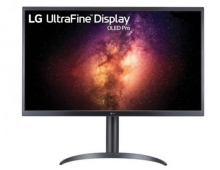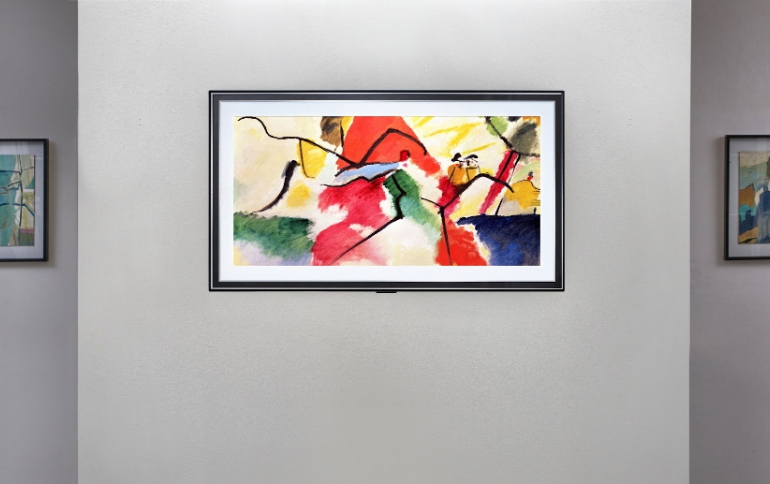
CES: LG Says New OLED TVs Bring Cinema, Sports, Gaming To Life In New Ways
LG Electronics (LG) is raising the bar again in 2020 with 13 new LG OLED models led by three new art-inspired GX Gallery series 4K Ultra HD TVs, 88- and 77-inch class Real 8K models and a new OLED screen size – 48-inch.
Unveiled at CES 2020, the new LG OLED TVs – and new 8K and 4K LG NanoCell LCD TVs – promise to deliver stunning picture quality and innovative design with upgraded performance and artificial intelligence-enabled features.
At the heart of the latest 8K and 4K LG OLED and 8K LG NanoCell TVs are a number of advanced core technologies, most notably the new α (Alpha) 9 Gen 3 AI Processor. This processor leverages upgraded processing power and artificial intelligence deep learning algorithms to improve on LG's renowned picture quality and enable a host of specialized features for various types of content including movies, games and sports.
LG's 2020 TVs flaunt elegant designs that integrate with any home decor. The all-new minimalist Gallery Series has an ultra-thin form factor – the 65-inch model is a mere 20 millimeters (0.79 inches) thin. Paired with an included wall mount, these 55-, 65- and 77-inch class models hang completely flush on the wall.
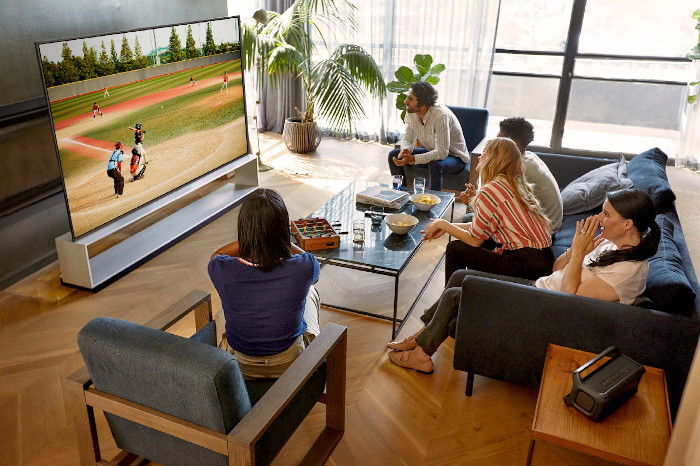
The GX Gallery series 4K UHD models join the LG OLED WX Wallpaper series (razor-thin 77- and 65-inch models) and the LG SIGNATURE OLED R (model 65RX).
The 2020 LG OLED ZX Real 8K models, delivering four times more detail than 4K TV, exceed the requirements established by the Consumer Technology Association's (CTA). The 88- and 77-inch LG OLED models are among the first to earn the new CTA 8K Ultra HD logo.
For 2020, while offering new versions of the two 4K UHD series (models CX, BX) in 77- (CX only), 65- and 55-inch class sizes, LG is also bringing the picture quality of LG OLED TV to an all-new screen size – 48-inch. This 4K UHD unit (model OLED48CX) reproduces even sharper picture quality with 8 million-plus pixels on the 48-inch screen, density comparable to that of a 96-inch 8K TV.
The 2020 LG NanoCell TV lineup is highlighted by four Real 8K TV models (75- and 65-inch models in Nano99 & Nano97 series), all exceeding the requirements needed to display the official industry 8K UHD logo from CTA.
Combining OLED's self-emissive technology and absolute blacks with support for Dolby Vision IQ and the UHD Alliance's new Filmmaker Mode, 2020 LG OLED TVs bring the cinema into the living room. They support Dolby Vision high dynamic range imaging, Dolby Atmos sound, and for the first time ever, Dolby Vision IQ. Dolby Vision IQ introduces new intelligent features for TVs to deliver optimal picture quality as the creatives intended, no matter the ambient light environment or content genre.
The new Filmmaker Mode, supported by Hollywood's directors, delivers images the way they intended. By disabling certain post-processing effects (such as motion smoothing, noise reduction and sharpening) while perfectly preserving correct aspect ratios, colors and frame rates, LG OLED TVs with the Filmmaker Mode faithfully replicate the original vision of the director. LG OLED TVs also have been recognized by the Hollywood Professional Association with its Excellence in Engineering Award as the first and only with integrated hardware-level calibration software.
LG's webOS smart TV platform will bring 2020 LG OLED and LG NanoCell TVs programming from a number of top global content providers through apps and services such as Disney+, Netflix and CBS All Access. New for 2020, the Apple TV app allows customers to subscribe and watch Apple TV+ and Apple TV channels as well as access their iTunes video library and buy or rent more than 100,000 films and TV shows. LG customers with 2018 and 2019 LG TV models will also be able to enjoy the Apple TV app this year.
LG's 2020 TVs are also ideal for gamers. As the first TV manufacturer to offer NVIDIA G-SYNC Compatibility, LG is expanding this capability in 2020 to 12 OLED TVs to provide a flawless PC gaming experience without screen tearing or other visual artifacts.

In addition, 2020 LG OLED TVs feature the HDR Gaming Interest Group's HGiG Mode so gamers can enjoy high quality visuals as game creators and developers intended when playing HDR games via consoles on their LG TVs. HGiG is a body made up of companies from the game and display industries that develops standards to improve the HDR gaming experience for consumers.
During intense gaming sessions, LG OLED TVs even help address eye fatigue. The Eye Comfort Display certification, from the international testing lab TÜV Rheinland, verifies that LG OLED TVs offer adjustability for blue light content, are flicker-free. LG OLED screens meet every TÜV testing criterion, including wide color gamut and HDR.
LG OLED TVs are designed for sports fans, too, made possible by the new α9 Gen 3 AI Processor – and sports-centric features.
Sports Alert helps users to keep track of their favorite teams and schedules and notifying them as soon as a team scores. Users can select their favorite teams in various sports – soccer, football, baseball, etc. – to receive automatic updates at the start of a match, whenever a team scores and when the game ends.
Sports fans can also benefit from enhanced sound. Viewers can connect the TV to Bluetooth speakers to create a more dynamic soundscape to create a real stadium environment.
New Framework For Advancing AI Technology
LG Electronics (LG) President and Chief Technology Officer Dr. I.P. Park also unveiled the framework for the future of artificial intelligence (AI) development with the title of "Levels of AI Experience: the Future of AI and the Human Experience".
The conceptual framework aligns with the LG ThinQ brand and its ambitious vision to transform the daily experience by connecting all aspects of people's lives with intelligent touchpoints.
Speaking at the Mandalay Bay Convention Center in Las Vegas, Dr. Park explained that, amidst a wave of AI-related ideas and concepts, it is important to share a structured framework for the development of AI across the industry so that we may create a meaningful impact on the lives of customers we serve.
Dr. Park was joined on stage by Jean-François Gagné, co-founder and CEO of Element AI, the Montreal-based company that built its reputation on effective AI implementation. Together, they discussed how the framework was developed and their responsibility as an industry when developing future technologies will play a transformative role and explained four levels of AI experience (AIX) – Efficiency, Personalization, Reasoning and Exploration – which are anchored in significant jumps in technical capability and its application.
Efficiency, the first level, is where specific device and system functions can be automated through simple commands, which is currently possible with most voice recognition and AI-enabled products on the market today. At this level, the AI automatically adjusts performance in relation to pre-established sensory input parameters, maximizing efficiency in user interactions. An example of first-level AI is the LG ThinQ air conditioner that has a smart sensor to detect the presence of people in a room and adjusting the temperature and airflow accordingly, Dr. Park explained.
The next level, Personalization, focuses on pattern learning to optimize and personalize device functions, Gagné said. AI-powered devices and services at this level can accumulate data from interactions with the environment and users, recognize patterns and use them to improve their ability to effectively perform tasks and simplify user interactions. Dr. Park described how LG's next-generation R9 robot vacuum cleaner will be able to learn from mistakes (such as getting stuck in gaps and corners) by remembering spatial patterns.
Reasoning, the third level, envisions an AI that uses causality learning through the collective intelligence of a system made up of different devices and services. By perceiving the cause of certain patterns and behaviors, AI at this level can better predict and promote positive outcomes for users. "Here, we can leverage the diversity of our product portfolio because we'll need many intelligent touchpoints that interact with the user and gather information to understand the 'why' and establish causality," noted Dr. Park.
Although still far in the future, level four, Exploration, is "the ultimate destination for LG's AI," Dr. Park concluded. Using a concept called Experimental Learning based on the scientific method, AI-enabled systems will be able to develop new capabilities through forming and testing hypotheses to uncover new inferences, enabling them to learn and improve, adding more value to users' lives.
"As pioneers in the field of AI it is our responsibility to consider the importance of the Human Experience whilst pushing the boundaries of AI research and development," added Element AI's Gagné. "Together with LG Electronics we hope that this work helps to set forth standards and principles that guide AI practitioners to consider a human centric approach when building the future."
Dr. Park also previewed AI innovations that will be featured in LG's exhibition space at CES 2020, opening January 7. Embodying the company's Anywhere is home concept, the LG ThinQ Zone will bring to life a connected lifestyle that extends beyond the front door, demonstrating how the company's AI products and services align with different aspects of everyday life.
The LG ThinQ Home experience begins with Smart Door, which verifies visitors with both facial recognition and vein authentication before unlocking. Biometrics also are required to access the fresh food storage facility, a secure space for delivered groceries. When exiting, you can use a screen on the inside of the door that displays useful information such as weather and traffic conditions. When set to depart mode, the Smart Door instructs LG ThinQ appliances to go into low power when all residents have left the house.
In the Connected Car Zone, LG will demonstrate a more personalized in-car experience that allows drivers and passengers to take a piece of home on the road with them. LG's connected car solution is based on its webOS Auto platform and was developed in partnership with leading auto seat manufacturer, Adient. Inside the vehicle there are OLED displays on which users can continue enjoying the TV programs and movies they started watching at home. The Personal Sound Zone delivers a unique multimedia experience for each rider while the voice-activated Virtual Personal Assistant isolates and recognizes voice commands even over loud music and conversations.
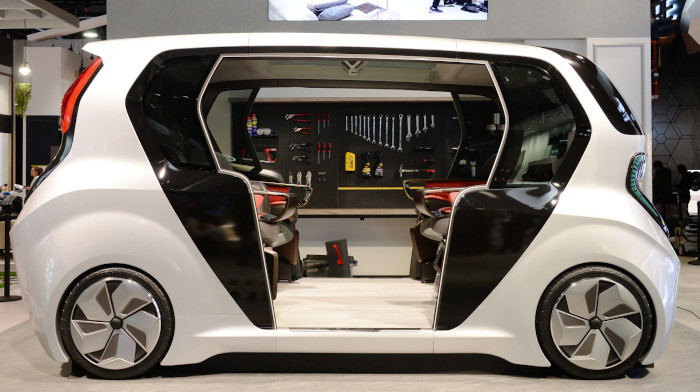
The ThinQ Fit Collection Zone will allow visitors to experience virtual fashion without having to step into a fitting room. LG ThinQ Fit, an evolution of LG's original Smart Mirror concept, uses 3D cameras to accurately measure the user's body to generate a realistic avatar for virtual fittings. The technology can use big data to offer style suggestions and links to platforms that allow for direct purchases of clothes.
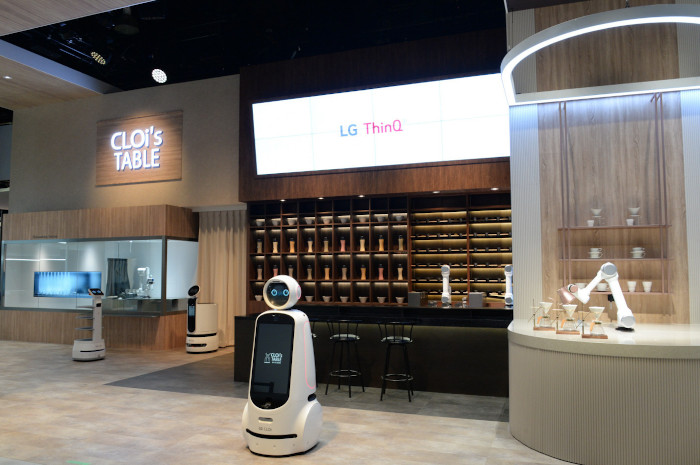
LG's robotic solutions at the show will demontrate their culinary skills, efficiency and first-class hospitality at CLOi's Table Zone, a futuristic restaurant where LG CLOi robots manage the entire operation from taking orders, cooking, serving and cleaning. Potential diners would make reservations remotely via the ThinQ app and browse the menu via a smart speaker, smart TV or smartphone.




